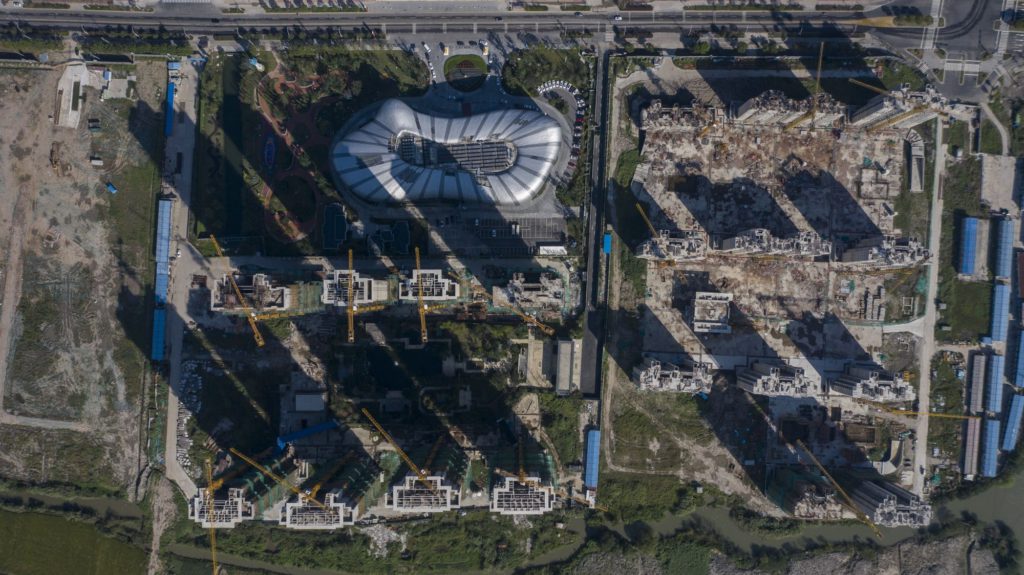(Bloomberg) — China Evergrande Group investors remain in the dark about the property developer’s progress in negotiating stake sales to meet its looming debt obligations, as a grace period on some of its dollar notes enters its final days.
Evergrande has yet to comment on a Reuters report that a yuan bond coupon due Tuesday had been paid. Chinese companies with bonds listed on mainland stock exchanges are typically only expected to post announcements to the bourses if obligations aren’t met. Evergrande has missed initial interest payment deadlines on several dollar bonds since last month, with some notes offering a 30-day grace period before default.
Evergrande’s shares have been suspended since Oct. 4 pending the announcement of a “major transaction” involving its property management unit and Hopson Development Holdings Ltd., local media reported at the time. REDD reported Tuesday that the deal had fallen through due to a lack of support from the local Guangdong government.
New-home prices fell in September for the first time since April 2015, data showed Wednesday, while a former state researcher suggested a broader rollout to China’s property tax. Sinic Holdings Group Co. became the latest developer to default, while Kaisa Group Holdings Ltd. cancelled meetings with some investors this week.
Key Developments:
- Chinese Developer Sinic Defaults Amid Evergrande Contagion
- China Home Sales Plunge 17% as Evergrande Crisis Deters Buyers
- China Channels Bernanke With Assurances Evergrande Is Contained
- China Eases Mortgages for Rest of Year Amid Evergrande Woes
- What Is China Evergrande and Why Has Trouble Spread?: QuickTake
- China Sells $4 Billion Dollar Bond as Evergrande Woes Fester
Kaisa Scheduling Conflict (2:36 p.m. H.K)
Kaisa Group Holdings has cancelled meetings with some investors that were scheduled to take place this week at an Asian credit conference organized by Bank of America Corp., people familiar with the matter said. The investors were told the meetings were cancelled due to a scheduling conflict. Kaisa’s bonds have tumbled this week.
Property Tax Trial Debate (12:45 p.m. H.K.)
Two articles published Tuesday show the prominence of the property-tax debate in China. The government can test the levy in more regions including the technology hub of Shenzhen as well as Hainan and Zhejiang provinces, wrote Jia Kang, who was previously the director of the fiscal science research institute at the Ministry of Finance.
The Wall Street Journal reported Tuesday that a plan to roll out a property tax more widely in the country has faced strong pushback from within the ruling Communist Party. President Xi Jinping mentioned property taxes in an August speech published by party journal Qiushi last week.
Sinic Becomes Latest Defaulter (10 a.m. H.K)
Sinic’s credit rating was lowered by S&P Global Ratings to Selective Default from CC. Sinic had warned earlier this month it was unlikely to repay a $250 million dollar bond due Oct. 18 and that may trigger cross-defaults on its two other notes. Sinic is much smaller than Evergrande, ranking 41st in a list of China’s biggest property developers by contracted sales as of August. Evergrande ranks third.
New-Home Prices Drop (9:30 a.m. H.K.)
New-home prices in 70 cities, excluding state-subsidized housing, slid 0.08% in September from August, National Bureau of Statistics figures showed. Values in the secondary market declined 0.19%, down for a second month.
September is traditionally a peak season for the home market. Yet residential sales tumbled 17% by area and investments slid for the first time since early 2020. The downturn has continued into this month. Existing-home sales plunged 63% from a year earlier in the first 17 days of October, according to a Nomura Holdings Inc. note.
Central Bank Injects Cash (9:20 a.m. H.K)
China’s central bank injected funds into the banking system to meet increasing demand for cash. The People’s Bank of China, which had been withdrawing short-term funding this month, cited tax and government bond issuance as reasons for Wednesday’s injection. Domestic banks are the biggest buyers of central government debt.
Evergrande, Hopson Yet to File Statements (8 a.m. H.K.)
Evergrande appears to be struggling to sell stakes in its listed units, which have tumbled in value this year. Shares of the company, its property services unit and Hopson are likely to remain halted in Hong Kong after none of the three firms filed statements to the stock exchange overnight. Negotiations to sell a 51% stake in Evergrande Property Services Group Ltd. to Hopson have been suspended, REDD reported Tuesday.
A stock can be halted for as long as 18 months before the exchange operator cancels the listing. Halted firms are still required to make regular public disclosures, including quarterly updates on their business operations.
China’s Land Market Slump (5:00 a.m. H.K.)
Land auction failures are on the rise across China. Faced with weakening funding access and rising borrowing costs amid the deepening crisis at Evergrande, many developers have been refraining from replenishing their land holdings. About 27% of land parcels offered by local governments went unsold in September as no developer submitted bids — the highest rate since at least 2018, according to data compiled by China Real Estate Information Corp., which tracks auctions across 128 Chinese cities.
During the latest round of auctions held by local governments, three quarters of transacted parcels were sold at government-dictated base prices versus a premium of 45% before, Jefferies analysts said in a recent note.
Evergrande dollar bond interest deadlines:
More stories like this are available on bloomberg.com
©2021 Bloomberg L.P.











